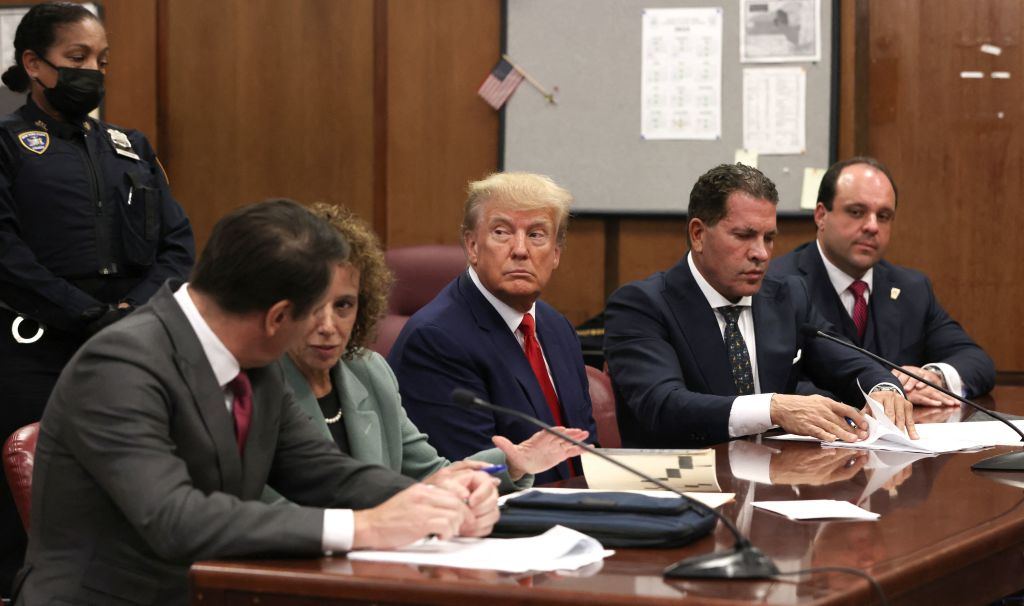Now is a time of woe, not just for Never Trump conservatives, but also for the much larger group of Republicans who made peace with Trump once but dread having to do it again.
In fact, just going by my unscientific survey, the melancholy is worse for those Republicans who may have agreed with the Never Trump crowd in principle (and in private), but for pragmatic and professional reasons found it necessary to spend years eating the steaming bowl of unpalatable fare that fate had put in front of them.
But after disappointing Republican performances in 2018, 2020 and 2022, almost entirely because of Trump's influence, a lot of these former accommodationists and transactionists have concluded—correctly—that Trump's an albatross for the GOP.
For all the talk about how this indictment helps Trump solidify Republican support, it hurts his—and the party's—prospects in 2024. People who voted against Trump in 2020—and against his most sycophantic disciples in 2022—are unlikely to suddenly change their minds about him because he got indicted for a scheme to pay hush money to an adult film actress. And contrary to the alternate reality peddled by Trump and his biggest fans that he is the voice of the American majority, more Americans dislike him than like him.
And, again, contrary to the echo-chamber mythmaking of Trump's P.R. team, reaction to the New York indictment confirms it hurts him. A new CNN poll finds that 1 in 5 Republicans approve of the indictment and 1 in 4 conservatives do. Majorities of independents (62 percent) and Democrats (94 percetn) approve. Overall, 6 in 10 Americans support the indictment.
Meanwhile, Republican voters are rallying around Trump. In other words, this indictment is good for Trump in the hothouse of Republican primary politics 10 months before the Iowa caucus, but affirmatively bad for a party that wants to win general elections.
At least Never Trumpers get the consolation prize of saying "I told you so." The Never Again camp, however, is probably despondent at the prospect of having to get out the spoon for another helping—and losing again.
The despair is understandable but possibly premature.
Manhattan District Attorney Alvin Bragg's indictment may be the first indictment of a former president, but it is unlikely to be the last. Georgia is likely to indict Trump for his effort to overturn the 2020 election, and most legal observers believe that Special Counsel Jack Smith will likely indict Trump on federal charges related to his actions on January 6, 2021, or his absconding with classified materials—or both.
Predicting what the future will look like is always a mistake. After months of revelations and Trump outbursts, it's not inconceivable that the MAGA forces will disperse from exhaustion.
But one should not bet the mortgage on a sudden outbreak of intestinal fortitude, strategic resolve, or conservative principle among GOP leaders when it comes to Trump. At least for some Republicans, supporting Trump on the New York indictment might be the best way politically to prepare for more serious indictments if they happen. (As a critic of Bragg's decision, I think opposing the indictment is a defensible position on the merits.)
Such positioning now could help inoculate against charges of reflexive Trump-hatred should weightier indictments drop. Right now, even Mike Pence and Ron DeSantis feel the need to defend Trump. But given that they want to run for the presidency, they're simply waiting for the opportunity to argue the GOP needs a fresh start.
It's worth recalling that despite the immediate frenzy of Republican support for Trump after the FBI search of Mar-a-Lago last August, Trump's poll numbers did not improve much, even among Republicans. Indeed, Trump's unfavorability numbers are remarkably high and stable.
As the New York drama unfolds, and the unseemly facts about porn star payoffs and Trumpian drama once again fill Americans' headspace, new indictments may seem less like fresh outrages from the "deep state" and more like last straws and justifications for pushing away the bowl.
Interestingly, former Arkansas Gov. Asa Hutchinson seized this moment to move up his formal announcement that he will be challenging Trump for the nomination and that Trump should drop out of the race because of all of his baggage.
Perhaps even more revealing, House Speaker Kevin McCarthy, among the most pliant of Trump enablers, recently suggested the front-runner now—i.e. Trump—may not be the eventual nominee. The 2024 race needs to be a referendum on Biden, he explained, and therefore the GOP needs a candidate who can make that case. "It's about addition, not subtraction," he told podcaster Dave Rubin.
That's not exactly a brave repudiation of Trump, but it is a baby step in the right direction.







Please note that we at The Dispatch hold ourselves, our work, and our commenters to a higher standard than other places on the internet. We welcome comments that foster genuine debate or discussion—including comments critical of us or our work—but responses that include ad hominem attacks on fellow Dispatch members or are intended to stoke fear and anger may be moderated.
With your membership, you only have the ability to comment on The Morning Dispatch articles. Consider upgrading to join the conversation everywhere.